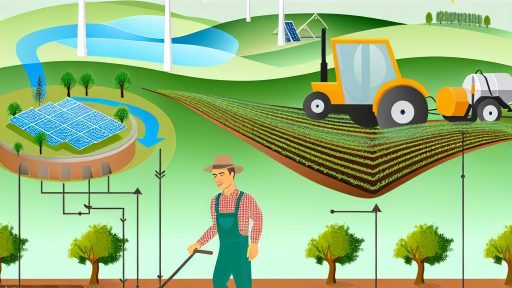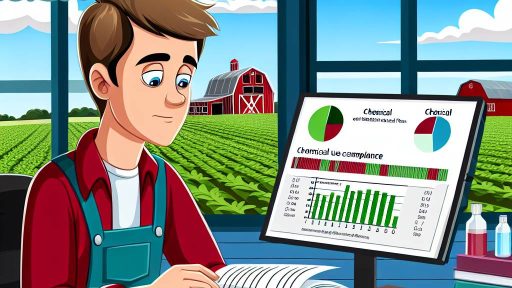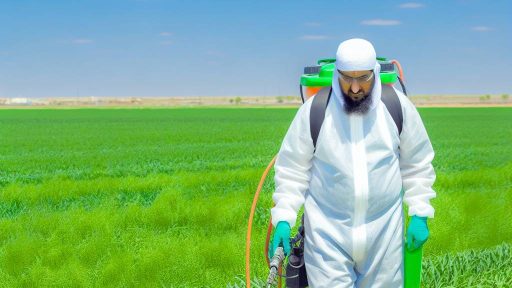Introduction to Conservation Programs and Their Importance in Farming
Conservation programs are essential for sustainable farming practices.
They aim to protect natural resources while improving agricultural productivity.
Moreover, these programs contribute to environmental health and biodiversity.
Farmers face numerous challenges, including climate change and soil degradation.
Thus, conservation programs provide effective solutions to these pressing issues.
Benefits of Conservation Programs
First, these programs enhance soil quality and fertility.
Healthy soil supports crop growth and reduces the need for chemical fertilizers.
Additionally, conservation practices address water management effectively.
Implementing techniques like crop rotation helps to conserve water resources.
This approach also prevents soil erosion and maintains land integrity.
Technological Innovations in Conservation
Technological advancements play a critical role in modern conservation programs.
For instance, precision agriculture uses data analytics for resource optimization.
This technology allows farmers to apply inputs more efficiently.
Furthermore, drones are utilized for monitoring crop health and field conditions.
This real-time data enhances decision-making processes in farming.
Transform Your Agribusiness
Unlock your farm's potential with expert advice tailored to your needs. Get actionable steps that drive real results.
Get StartedCommunity Engagement and Education
Engaging local communities is vital for the success of conservation programs.
Education initiatives raise awareness about sustainable practices and their benefits.
Workshops and training sessions empower farmers with essential knowledge.
Collaboration among farmers, scientists, and policymakers enhances program effectiveness.
Ultimately, these partnerships drive the adoption of innovative conservation methods.
Overview of Technological Innovations Impacting Conservation Efforts
The Role of Precision Agriculture
Precision agriculture revolutionizes farming practices across the globe.
It utilizes GPS technology to optimize field-level management.
This innovation allows farmers to monitor crop health efficiently.
For instance, drones assess field conditions to identify issues early.
As a result, farmers can apply water and nutrients precisely where needed.
Data-Driven Decision Making
Data analytics play a crucial role in modern farming.
Farmers can harness real-time data for better crop management.
Data helps predict weather patterns, maximizing crop yield potential.
Moreover, it enables farmers to adjust practices based on insights.
This leads to improved resource allocation and waste reduction.
Innovative Water Management Systems
Water conservation techniques have gained prominence in agriculture.
Smart irrigation systems now adjust water usage based on real-time conditions.
These systems reduce water waste and improve overall efficiency.
Farmers benefit significantly from technologies like soil moisture sensors.
Consequently, they can conserve water while ensuring crop health.
Integration of Renewable Energy
Renewable energy sources are transforming the agriculture landscape.
Solar panels and wind turbines provide sustainable power to farms.
These technologies reduce dependence on fossil fuels substantially.
As a result, farmers lower their operational costs over time.
Showcase Your Farming Business
Publish your professional farming services profile on our blog for a one-time fee of $200 and reach a dedicated audience of farmers and agribusiness owners.
Publish Your ProfileThis shift supports eco-friendly farming practices and boosts profitability.
Collaboration with Tech Startups
Partnerships with technology startups drive innovation in agriculture.
Many startups develop solutions tailored for specific conservation efforts.
Farmers gain access to cutting-edge tools through these collaborations.
These partnerships often introduce exciting technologies like AI-driven management.
Ultimately, they enhance sustainable practices within the agricultural sector.
Precision Agriculture: Leveraging GPS and IoT for Sustainable Farming
Introduction to Precision Agriculture
Precision agriculture transforms how we approach farming today.
It utilizes advanced technologies to enhance productivity.
This method focuses on managing variability in crops.
Farmers can make informed decisions based on data.
The Role of GPS Technology
Global Positioning System (GPS) technology plays a crucial role in precision farming.
It allows farmers to map their fields accurately.
Farmers can monitor crop health using real-time data.
GPS technology helps in precision planting and fertilization.
Utilizing Internet of Things (IoT) Devices
The Internet of Things (IoT) significantly enhances farming practices.
IoT devices collect data from various sources in the field.
Sensors monitor soil moisture and temperature continuously.
This data enables farmers to optimize irrigation practices.
Benefits of Precision Agriculture
Adopting precision agriculture promotes sustainable farming practices.
The approach leads to higher crop yields with fewer resources.
- It minimizes chemical usage and reduces environmental impact.
- Farmers can save money through efficient resource management.
- Precision agriculture improves overall farm management efficiency.
Challenges to Implementation
Despite its advantages, precision agriculture faces challenges.
High technology costs can deter many farmers.
Additionally, there is a need for adequate training in tech usage.
Farmers must adapt to new systems to gain full benefits.
The Future of Precision Agriculture
The future of farming lies in continued technological advancements.
Developments in AI and machine learning will enhance precision agriculture.
Farmers will access more predictive tools for better decision-making.
Moreover, collaboration among tech companies and agronomists is crucial.
This partnership will drive innovation and efficiency in the sector.
Delve into the Subject: Understanding Animal Welfare Laws and Their Impact on Farming
Drones and Remote Sensing: Assessing Land and Crop Health Efficiently
Overview of Drones in Agriculture
Drones have emerged as valuable tools in modern agriculture.
They offer precision and efficiency in monitoring fields.
Farmers can now gather data quickly and accurately.
This technology significantly reduces labor costs.
Additionally, drones minimize the time required for inspections.
Remote Sensing Technology
Remote sensing plays a crucial role in agricultural management.
It captures data about crops without physical contact.
Farmers use satellite imagery and aerial photography for insights.
This information informs decisions on planting and harvesting.
Moreover, it helps in assessing the overall health of the crops.
Showcase Your Farming Business
Publish your professional farming services profile on our blog for a one-time fee of $200 and reach a dedicated audience of farmers and agribusiness owners.
Publish Your ProfileBenefits of Using Drones
- Drones provide real-time data for informed decision-making.
- They enhance the accuracy of crop assessments.
- Drones facilitate early detection of diseases and pests.
- They enable efficient resource management, including water and fertilizers.
- Drones can cover large areas in a short time frame.
Case Studies of Successful Implementation
Agricultural firms are adopting drone technology worldwide.
GreenField Farms in California uses drones for crop imaging.
This practice has improved yield predictions by 30%.
Meanwhile, BrightHarvest in Florida monitors irrigation needs through drones.
Their success has led to a 20% reduction in water usage.
Future of Drones in Agriculture
The future of drones in agriculture looks promising.
Advancements in artificial intelligence will enhance their capabilities.
Drones will likely play a larger role in precision farming.
Farmers can expect more cost-effective solutions through these innovations.
Ultimately, drones will contribute to sustainable farming practices.
Gain More Insights: Maximizing Farm Profitability with Agricultural Insurance
Data Management Systems: Analyzing Field Data for Better Decision-Making
The Importance of Data in Farming
Data plays a critical role in modern farming practices.
Agricultural decisions based on accurate data yield better outcomes.
Farmers can enhance their productivity and sustainability through data analysis.
Types of Data Collected
Farmers collect various types of data for analysis.
Field data often includes soil health, crop yield, and weather patterns.
Additionally, pest and disease incidence contributes valuable insights.
Analyzing this data helps farmers make informed decisions.
Data Management Tools and Software
Several data management tools assist farmers in data analysis.
These tools streamline data entry and processing tasks.
For instance, platforms like Ag Leader and Precision Planting offer real-time analysis.
FarmLogs and Cropio provide functionalities for monitoring field conditions.
Integration with New Technologies
Technological advancements enhance data collection and analysis.
Drones and satellite imagery capture high-resolution data for farmers.
Furthermore, IoT devices provide real-time data from the field.
Farmers can analyze this data using machine learning algorithms.
Making Data-Driven Decisions
Data-driven decision-making promotes proactive farming strategies.
Farmers can optimize their resource allocation using data insights.
For example, they can determine the best times for planting and harvesting.
Ultimately, this approach minimizes waste and maximizes yield.
Case Studies in Data Management
Several farms have successfully implemented data management systems.
StarView Farms reported a 20% increase in yield after adopting data analysis.
Green Valley Agriculture improved its pest management through analytics.
Such success stories highlight the potential of data management in farming.
Gain More Insights: How Farmers Can Benefit from Solar Energy Incentives

Biotechnology and Genetic Engineering: Enhancing Crop Resilience and Soil Health
Understanding Biotechnology in Agriculture
Biotechnology plays a vital role in modern agriculture.
It enables farmers to improve crop yields effectively.
Moreover, it aids in developing pest-resistant varieties.
This method minimizes the need for chemical pesticides.
Consequently, farmers can achieve sustainable farming practices.
Showcase Your Farming Business
Publish your professional farming services profile on our blog for a one-time fee of $200 and reach a dedicated audience of farmers and agribusiness owners.
Publish Your ProfileThe Role of Genetic Engineering
Genetic engineering enhances specific traits in crops.
This technology allows for the modification of plant DNA.
As a result, crops can withstand harsh environmental conditions.
For example, scientists create drought-resistant varieties.
These innovations help farmers in regions facing water scarcity.
Benefits of Enhanced Crop Resilience
Improved crop resilience leads to higher food security.
It reduces the risk of crop failure due to weather extremes.
Farmers experience increased productivity through innovation.
Additionally, resilient crops can thrive in poorer soils.
This enhances overall soil health over time.
The Impact on Soil Health
Genetic engineering contributes positively to soil biology.
Certain crops improve nutrient cycling within the soil.
For instance, legumes can enrich soil with nitrogen.
Consequently, this practice reduces the need for synthetic fertilizers.
Sustainable farming methods promote healthier ecosystems.
Future Perspectives in Biotechnology
As technology evolves, new solutions will emerge.
Future innovations could focus on climate adaptation.
Scientists are exploring gene editing for rapid crop improvement.
Moreover, they aim to enhance the nutritional content of crops.
This will support global health initiatives significantly.
You Might Also Like: A Comprehensive Guide to Animal Welfare Regulations for Farmers
Water Management Technologies
Irrigation Innovations for Sustainable Use
Efficient irrigation plays a vital role in modern farming.
Farmers increasingly adopt innovative technologies for water management.
These advancements optimize water use and conserve resources.
One prominent innovation is drip irrigation systems.
Drip systems deliver water directly to plant roots.
This method significantly reduces water wastage.
Moreover, it minimizes weed growth compared to traditional methods.
Another noteworthy technology is soil moisture sensors.
These devices help monitor and regulate soil moisture levels.
Consequently, farmers can make informed irrigation decisions.
Automated irrigation systems improve timing and efficiency.
For example, smart controllers adjust schedules based on weather data.
This feature prevents overwatering and under-watering.
Furthermore, technologies like rainwater harvesting gain traction.
Farmers collect and store rainwater for irrigation use.
This strategy promotes sustainability and reduces dependency on groundwater.
Advancements in Irrigation Technology
Technological advancements continue to evolve irrigation practices.
AI-powered solutions provide continuous data analysis.
Farmers receive real-time insights into crop water needs.
Showcase Your Farming Business
Publish your professional farming services profile on our blog for a one-time fee of $200 and reach a dedicated audience of farmers and agribusiness owners.
Publish Your ProfileAdditionally, precision agriculture enhances irrigation efficiency.
This approach utilizes GPS technology for targeted watering.
As a result, it conserves water while maximizing crop yield.
Furthermore, mobile applications are transforming irrigation management.
Farmers can control systems remotely from their smartphones.
This feature offers convenience and efficiency in operations.
Researchers are also exploring sustainable water sources.
For instance, treated wastewater is now considered for irrigation.
Utilizing this resource can significantly reduce water shortages.
Implications of Irrigation Innovations
Irrigation innovations are essential for sustainable farming.
They allow for efficient water management practices.
As technology advances, possibilities continue to expand.
Farmers who embrace these changes can improve productivity.
Additionally, they contribute to environmental conservation efforts.
Ultimately, these innovations pave the way for a sustainable future.
Case Studies of Successful Implementation of Technology in Conservation Programs
Precision Agriculture in Action
Farmers in Texas adopted precision agriculture to optimize resource use.
They utilized GPS technology to create detailed maps of their fields.
This innovation allowed them to apply fertilizers more efficiently.
As a result, crop yields significantly increased while reducing chemical runoff.
Remote Sensing for Soil Health Monitoring
Agricultural researchers in California implemented remote sensing technologies.
They monitored soil moisture levels and nutrient content from the sky.
This approach provided farmers with timely information on soil conditions.
Consequently, they adjusted irrigation and fertilization practices effectively.
Drone Technology for Crop Surveillance
Farmers in Iowa began using drones to survey their crops.
Drones equipped with cameras captured high-resolution images of fields.
Farmers analyzed these images to identify pest infestations early.
This proactive measure led to timely interventions and reduced crop loss.
Mobile Apps for Sustainable Farming Practices
In New York, a mobile app connected farmers with conservation experts.
The app provided guidance on sustainable farming techniques.
Farmers accessed tips on crop rotation and cover cropping.
Additionally, they received alerts about changing weather patterns.
This information enabled them to make informed decisions on their farms.
Smart Irrigation Systems
Florida farms adopted smart irrigation systems powered by IoT.
These systems adjusted watering schedules based on real-time weather data.
Farmers saved water and minimized wastage through automation.
Overall, this technology enhanced crop health and sustainability efforts.
Collaborative Platforms for Sharing Best Practices
A collaborative platform emerged in Illinois for farmers focused on conservation.
This platform facilitated knowledge exchange among agricultural stakeholders.
Farmers shared insights about innovative practices and technologies.
The resulting community fostered a culture of continuous improvement.
Showcase Your Farming Business
Publish your professional farming services profile on our blog for a one-time fee of $200 and reach a dedicated audience of farmers and agribusiness owners.
Publish Your ProfileAdditional Resources
House Agriculture Committee Completes Markup of 2024 Farm Bill …




